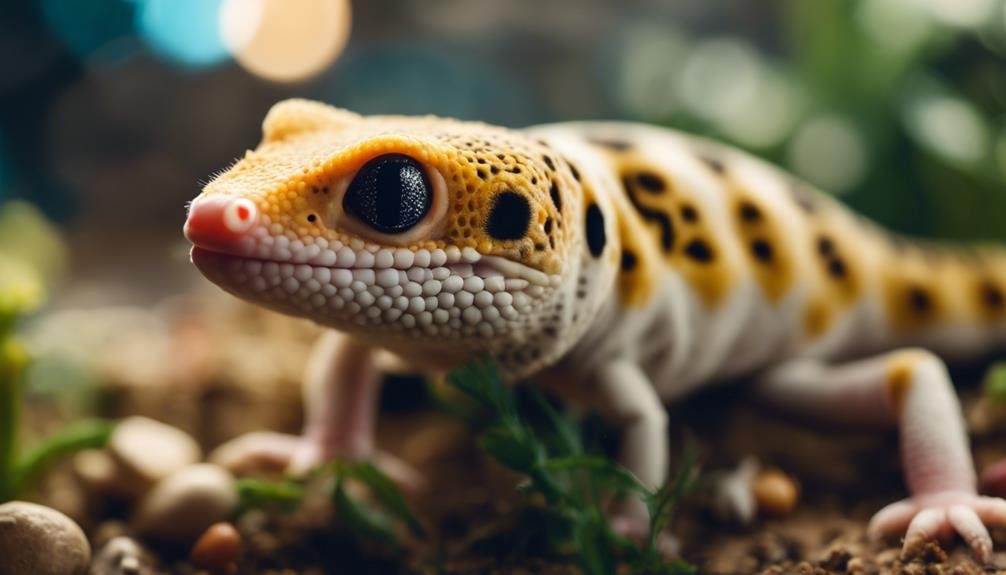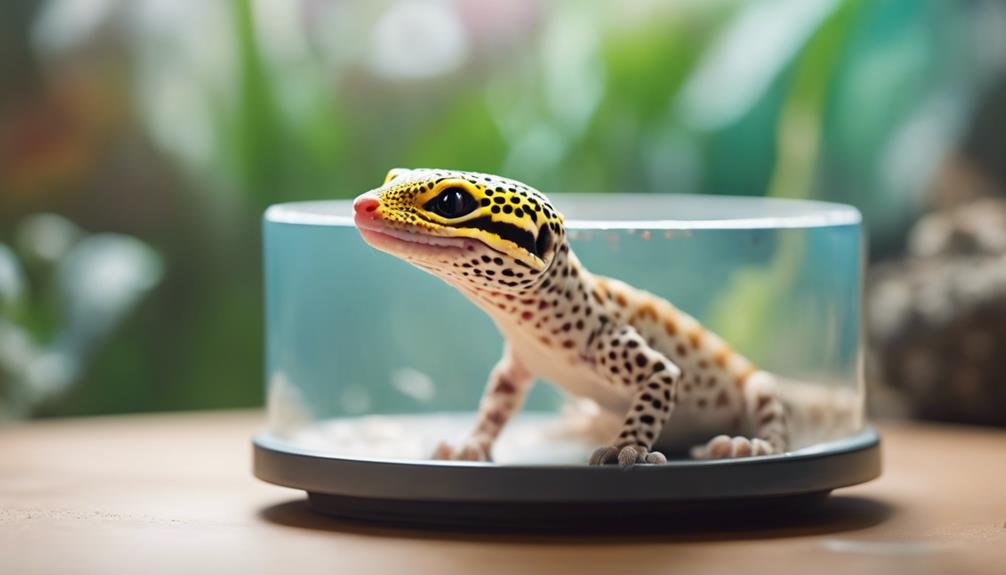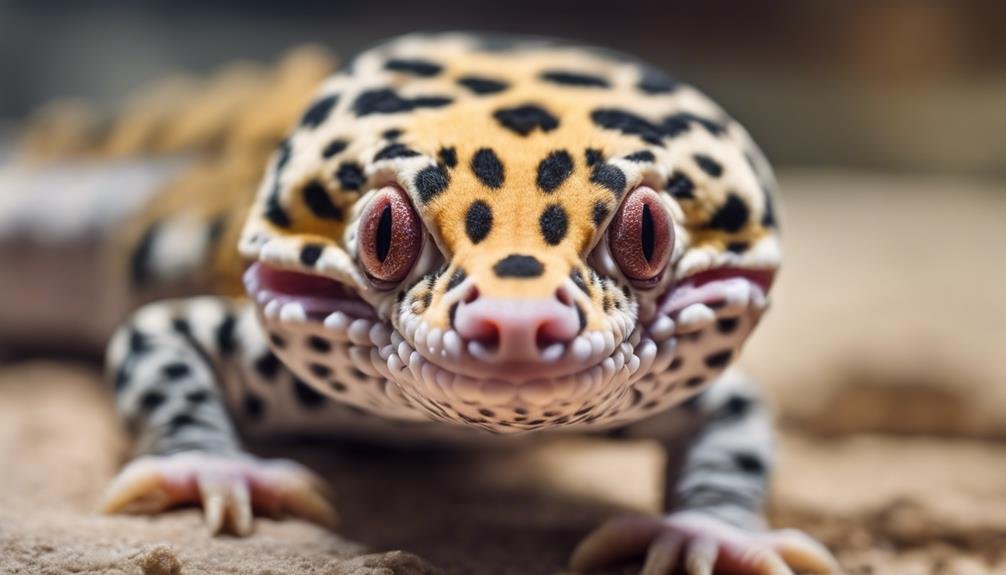As a leopard gecko owner, you’re probably well aware of the joy these creatures bring into your life. However, you also need to be on the lookout for mouth rot, a condition that’s as serious as it sounds. It’s not just about keeping their tank clean; you’ve got to monitor their diet, watch for subtle changes in behavior, and know the signs of this bacterial infection. Without proper care, mouth rot can escalate quickly, leading to significant health issues. But what exactly should you look for, and more importantly, how can you prevent or treat it? Let’s explore the essential steps you need to take to make sure your scaly friend stays healthy and happy.
Key Takeaways
- Ensure a clean habitat with regular cage cleanings to prevent bacterial growth that can cause mouth rot in leopard geckos.
- Provide fresh, clean water daily and a balanced diet to support overall health and prevent malnutrition, reducing the risk of mouth rot.
- Monitor for signs of mouth rot, such as loss of appetite, unusual buildups around the mouth, and swelling or discoloration along the teeth.
- For treatment, consult a veterinarian for a diagnosis and a tailored plan, which may include systemic antibiotics to fight the infection.
- Maintain excellent oral hygiene by cleaning or irrigating the affected area with a disinfectant solution as part of the treatment regimen.
Understanding Mouth Rot
Mouth rot, a serious bacterial infection, targets your leopard gecko’s mouth, impacting its gums, teeth, and jawbone. It’s a condition that can lead to significant discomfort and health issues if not addressed promptly. Understanding what causes mouth rot and how it affects your pet is the first step in tackling this problem. The infection stems from a variety of bacteria that thrive in unsanitary conditions or as a result of injury. Hence, maintaining a clean and safe environment for your leopard gecko is vital.
The best way to prevent mouth rot is by ensuring your gecko’s habitat is clean and well-maintained. Regular cage cleanings and providing fresh, clean water daily can greatly reduce the risk of bacterial infections. Additionally, monitoring your gecko for any signs of injury and addressing them immediately can prevent bacteria from gaining a foothold. Remember, prevention is always easier than treatment.
Promptly addressing any issues that could lead to mouth rot, such as ensuring your leopard gecko has a balanced diet to prevent malnutrition, plays a significant role in prevention. By taking these proactive steps, you’re not just preventing mouth rot but also ensuring the overall well-being of your pet.
Identifying Symptoms
After understanding the cause and prevention of mouth rot, it’s vital to recognize the symptoms to catch the condition early in your leopard gecko. Spotting signs like loss of appetite and unusual buildups around the mouth can be alarming but are key indicators of this infection. You might also notice swelling around the mouth or head, which shouldn’t be ignored. Discoloration or inflammation along the teeth and small cuts or deformations on the lips are telling signs that your pet is suffering from mouth rot.
This condition can escalate quickly, leading to serious infections such as jaw bone infections, nasal or eye infections, and even abscesses if left untreated. The stakes are high, as mouth rot can be fatal. However, you’re not powerless. Early detection plays a vital role in the successful treatment of mouth rot. By keeping a close eye on these symptoms and maintaining good oral hygiene, you’re taking significant steps toward prevention.
Causes and Risk Factors


Understanding the causes and risk factors behind mouth rot in leopard geckos is key to preventing this dangerous condition. This ailment doesn’t just appear out of nowhere; it’s often the result of a combination of factors that compromise your gecko’s oral health and overall well-being. By getting to know what contributes to this condition, you’re taking a significant step towards keeping your pet healthy and happy.
- Small cuts in the mouth: These can happen during feeding, especially if your gecko chomps down on hard or sharp-edged food items.
- Food particles stuck in teeth: Leftover food can breed bacteria, leading to infections.
- Bacterial infections: These are a primary cause of mouth rot, often exacerbated by other underlying issues.
- Poor oral hygiene: Neglecting regular checks and cleanings of your gecko’s mouth sets the stage for disease.
- Weakened immune system: Often the result of a poor diet, a compromised immune system can’t fight off infections effectively.
Treatment Options
To effectively combat mouth rot in your leopard gecko, starting with a veterinarian’s diagnosis and a tailored treatment plan is essential. Mouth rot, a serious condition in leopard geckos, demands immediate attention and a strategic approach to treatment. After diagnosing your pet, a reptile veterinarian may recommend systemic antibiotics to tackle any underlying bacterial infection contributing to the condition.
Systemic antibiotics are a cornerstone in managing mouth rot, as they help to eradicate the infection from the inside out. However, treatment doesn’t stop with medication alone. You’ll also need to maintain impeccable husbandry practices, ensuring your leopard gecko’s habitat supports their recovery. This includes keeping their enclosure clean and at the right humidity and temperature levels.
In addition to these measures, gently cleaning or irrigating the affected area with a disinfectant solution can support the healing process. This step should always be done under the guidance of your vet to avoid further injuring your pet.
Seeking veterinary care quickly is essential. Without professional intervention, mouth rot can severely impact your leopard gecko’s health. Remember, early diagnosis and a thorough treatment plan are your best allies in fighting mouth rot and ensuring your gecko’s well-being.
Prevention Strategies


How can you prevent mouth rot in your leopard gecko? Preventing this condition is important for your pet’s overall health and happiness. By taking proactive steps, you can minimize the risk and guarantee your leopard gecko leads a healthy life. Here are key strategies to keep in mind:
- Regularly check your gecko’s mouth for any signs of issues to avoid mouth rot.
- Provide a well-balanced diet rich in vitamins and minerals to support your gecko’s immune system.
- Maintain good oral hygiene by keeping your gecko’s habitat clean and providing fresh water.
- Monitor your gecko for any changes in behavior or appearance that could indicate potential health issues.
- Seek veterinary advice and guidance on oral health and preventive measures for your leopard gecko.
Will Tail Regrowth in Leopard Geckos Increase the Risk of Mouth Rot?
Leopard gecko tail regrowth effects may include an increased risk of mouth rot. When a gecko loses its tail and it regrows, the new tail may not have the same blood supply, making it more susceptible to infection. It’s important to monitor the regrowth closely and seek veterinary care if any issues arise.
Frequently Asked Questions
How Do You Get Rid of Mouth Rot on Leopard Geckos?
To guarantee the health of leopard geckos, you’ll need a vet’s help. Avoid DIY treatments; they’re not safe. Your vet might use antibiotics or special mouthwashes.
To prevent it, focus on their environment. Guarantee proper gecko hydration, reduce stress, and incorporate nutritional supplements into their diet. Regular checks and a balanced habitat go a long way.
If you spot symptoms early, treatment is more straightforward and less stressful for your gecko.
How Do You Prevent Mouth Rot?
To prevent mouth rot, you need to focus on diet optimization, habitat humidity, and stress reduction.
Keep your gecko’s habitat at the right temperature and humidity, and feed them a balanced diet to boost their immune system.
Regularly check their mouth for early signs of trouble. Clean their enclosure often and reduce stress factors to keep them healthy.
If you’re unsure, consult a vet for advice tailored to your pet’s needs.
Can Mouth Rot Be Treated at Home?
You really shouldn’t try treating mouth rot at home. While focusing on nutrition and reducing stress factors can help prevent it, once your gecko’s got mouth rot, home remedies just won’t cut it. These steps are good for overall health but won’t cure the infection.
You need a vet’s help to get the right meds and treatment. Don’t risk your gecko’s health with DIY treatments; professional care is key.
What Medication Is Used for Reptile Mouth Rot?
For reptile mouth rot, you’ll likely use antibiotics like enrofloxacin, amikacin, and metronidazole. If there’s a fungal issue, fluconazole might be on the list.
Don’t forget, dosage specifics are essential; you’ve got to follow your vet’s instructions to the letter. A chat with your veterinarian will make sure you’re using the right meds and amounts.
Completing the full course is key to knocking out that infection for good.
Conclusion
To sum up, you have the ability to prevent and treat mouth rot in your leopard gecko by staying vigilant. Keep their habitat clean, provide fresh water daily, and make sure they’re getting a nutritious diet.
If you notice any symptoms, don’t delay—seek veterinary care immediately. With the right treatment and excellent care, your gecko can recover from this painful condition.
Remember, prevention is always easier than cure, so prioritize your pet’s environment and health to keep them happy and thriving.


